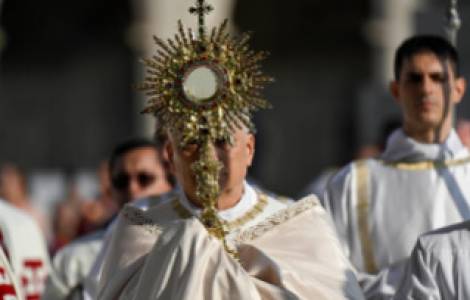
VaticanMedia
Rome (Agenzia Fides) – “Dear brothers and sisters, it is wonderful to be in the presence of Jesus.” With these words, Pope Leo XIV began his homily this afternoon as he celebrated the Eucharistic Liturgy for the Solemnity of Corpus Christi in the forecourt of the Basilica of St. John Lateran, the cathedral of Rome.
The Gospel reading from Luke, recounting the miracle of the multiplication of the loaves and fishes, narrated the multitudes who “spent long hours listening to him speak about the Kingdom of God and seeing him heal the sick.” On Corpus Christi, a similar crowd gathered around the Successor of Peter for Holy Mass and the subsequent procession from the Lateran Basilica to the Basilica of Santa Maria Maggiore. That Eucharistic bread, said Pope Leo in his homily, quoting St. Augustine, is “bread that restores and does not run short; bread that can be eaten but not exhausted.”
In the deserted place where they had listened to Jesus' words and wished to remain near Him - the Bishop of Rome emphasized, referring to the Gospel passage - “evening fell and there was nothing to eat. The hunger of the people and the setting of the sun speak to us of a limit that looms over the world and every creature: the day ends, as does the life of every human being. At that hour of need and of gathering shadows, Jesus remains present in our midst.”
Jesus multiplies the loaves and fishes for the hungry multitude, even though the disciples had advised him to dismiss the crowds. A suggestion, the Pope noted, “which reveal their lack of faith. For where the Lord is present, we find all that we need to give strength and meaning to our lives.” Jesus responds, “to the appeal of hunger with the sign of sharing: he raises his eyes, recites the blessing, breaks the bread, and feeds all present.”
Today, in place of the crowds mentioned in the Gospel - the Pope continued, referring to the present day - “entire peoples are suffering more as a result of the greed of others than from their own hunger.” And faced with the misery of so many, he added, “the amassing of wealth by a few is the sign of an arrogant indifference that produces pain and injustice. Rather than sharing, it squanders the fruits of the earth and human labour. Especially in this Jubilee Year, the Lord’s example is a yardstick that should guide our actions and our service: we are called to share our bread, to multiply hope and to proclaim the coming of God’s Kingdom.”
The hunger of the crowd, satisfied by Jesus’ miracle - the Pope continued, linking the Gospel story to the mystery of the Eucharist - is a sign of the hunger for salvation present in every human heart. In saving the crowds from hunger, “Jesus proclaims that he will save everyone from death. That is the mystery of faith, which we celebrate in the sacrament of the Eucharist. For just as hunger is a sign of our radical needs in this life, so breaking bread is a sign of God’s gift of salvation.” And “our hungry nature bears the mark of a need that is satisfied by the grace of the Eucharist.”
The Eucharist - the Successor of Peter added, quoting the Catechism of the Catholic Church - is “the true, real, and substantial presence of the Savior, who transforms the bread into Himself, so that He may transform us into Himself. Living and life-giving, the Corpus Christi makes us - the Church itself - the Body of the Lord.”
Even the Eucharistic procession, “which we are about to undertake,” Pope Leo emphasized at the end of his homily, “is a sign of that journey. Together, as shepherds and flock, we will feed on the Blessed Sacrament, adore him and carry him through the streets. In doing so, we will present him before the eyes, the consciences and the hearts of the people. To the hearts of those who believe, so that they may believe more firmly; to the hearts of those who do not believe, so that they may reflect on the hunger present within them and the bread that alone can satisfy it.” (GV) (Agenzia Fides, 22/6/2025)
 ASIA/LEBANON - General Abagnara (UNIFIL): “The Pope’s visit confirms us in our peacekeeping mission”
ASIA/LEBANON - General Abagnara (UNIFIL): “The Pope’s visit confirms us in our peacekeeping mission”